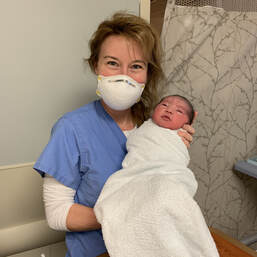 Women's specialists define Uterine Fibroids Women's specialists in Atlanta and Alpharetta GA say that uterine fibroids are noncancerous growths of the uterus that typically appear during childbearing years. Also called leiomyomas or myomas, these develop from the graceful muscular wall of the uterus. One cell divides repeatedly eventually creating a firm rubbery mass that's distinct from the nearby tissue (they're extremely common). In fact, statistics show that three out of 4 women might have uterine fibroid sometime during their lives. Many are unaware of this health condition because there are often no symptoms. Symptoms & diagnosis Women's specialists affirm that some women with fibroids suffer from symptoms like:
The presence of symptoms varies from one woman to another. The fibroid location, size, and number may influence signs and symptoms. Discovering fibroids can occur during a routine pelvic examination. The doctor may detect irregularities that need further testing. An ultrasound exam will provide an image of the uterus which can indicate the presence of fibroids. An ultrasound test will provide a map of where the fibroids are located and their size. Causes and treatment of fibroids The exact reason for uterine fibroids is unknown but it's believed to be a mixture of genetic factors and hormones. There appears to be a familial predisposition to create fibroids. African American women are way more likely to suffer from this health issue: fibroids. Atlanta and Alpharetta Obstetrics and Gynecology are proud to supply an unlimited array of potential fibroid treatments. They provide medical therapy for control of menstrual abnormalities, medical therapy for the treatment of fibroids, and also surgical removal of fibroids with or without preservation of the uterus for future childbearing. Top women's specialists in Atlanta and Alpharetta Are you living in the Atlanta and Alpharetta area and looking for the best women's specialist in town, well look no further because we have the best service to offer you! For most women who require fibroid removal (myomectomy) and uterine removal (hysterectomy), a minimally invasive surgery through laparoscopy can be an effective one. If you have got uterine fibroids, and particularly if you suffer from bothersome symptoms associated with your uterine fibroids, please contact us for detailed discussion with regards to treatment options and we are glad to answer and tailor the right treatment for you. We are your local Women's specialist. Book a consultation with your top Alpharetta and Atlanta OBGYN for your obstetrics and gynecology care and learn more about the Covid-19 vaccine for pregnant women.
0 Comments
 Obstetrician and Gynecologist - learning the difference An Obstetrician specifically deals with the welfare of the pregnant woman and her baby. During pregnancy, a number of complications can arise such as ectopic pregnancy, which is a condition where the embryo is in a fallopian tube, fetal distress caused by compression, problems with the placenta, or high blood pressure which can be a forerunner of a serious illness called pre-eclampsia. The obstetrician is trained in these and many other complications of childbirth and ensures both mother and baby are safely guided through all of the phases of pregnancy and childbirth. Whether the baby is delivered vaginally or through a planned or emergency caesarian section an obstetrician is trained to handle any change that is presented during the natural, but sometimes complex process of childbirth. Following delivery, an obstetrician is focused on the health of the mother and child ensuring that both make the transition into routine daily life without deadly complications. While most gynecologists are also obstetricians, the field of gynecology focuses on all other aspects of a woman’s reproductive health from the onset of puberty through menopause and beyond. Women see their gynecologists for their annual Pap tests and pelvic exam. Other reasons a woman would see her gynecologist are for:
Gynecology diagnoses and treats diseases of the reproductive organs including cancer of the ovaries, uterus, cervix, vagina, and fallopian tubes. A gynecologist also treats prolapse of the pelvic organs. This is a condition usually present in postmenopausal women with weakened pelvic muscles that cannot support the uterus or bladder properly. Other diseases treated are yeast and bacterial infections, irregular and painful menstruation, painful intercourse, and other diseases related to menopause which may require surgery. Gynecology encompasses specific surgical procedures related to female reproductive organs. The most common surgical procedures are:
OBGYN near Northside Hospital At Atlanta OBGYN we are fully focused on providing preventive health care and treatment for female diseases, for women of all ages as well as providing full support for mother and baby from conception to birth. Whether you are having your first baby, dealing with menopause, or anything in between, we have a full complement of medical specialists ready to help you. Book a consultation with your top Alpharetta and Atlanta OBGYN for your obstetrics and gynecology care.  OBGYN near Northside Hospital for you OBGYN near Northside Hospital advises every woman on how important it is to have annual screening and any time you have concerns about symptoms such as vulvar, pelvic, and vaginal pain or abnormal bleeding from the uterus. What are the conditions treated by OBGYNS? OBGYN near Northside Hospital commonly treat conditions which may include:
OBGYNs in the U.S. often offer both gynecological and general health care. At what age can a girl/lady see an OBGYN? An OBGYN can treat a girl or a woman of any age. Mainly from 13 to 15 years to get to know each other and get comfortable asking questions or talking about sexuality, menstruation, and so on, and has a point of contact should symptoms surface in the future. It also gives the OBGYN a chance to guide a woman’s overall welfare in the long term, through counseling on vital health and lifestyle issues. What to expect from an OBGYN visit? What happens at the OBGYN depends on the reason for the visit and the patient's situation. At any visit with the OBGYN, it is worth remembering:
It is best to avoid sexual activity, using a vaginal douche, or using tampons for 2 days before a gynecological examination. OBGYN near Northside Hospital As an OBGYN near Northside Hospital, our patients' health and overall wellbeing matter to us. Book a consultation with your top Alpharetta and Atlanta OBGYN for your obstetrics and gynecology care. 4/15/2021 0 Comments OBGYN in Atlanta and Alpharetta GA talks about pregnancy and the COVID-19 vaccine An OBGYN in Atlanta and Alpharetta GA will tell you that it’s safe to get a COVID-19 vaccine while pregnant. They can answer your common questions and concerns about the vaccine. Is the COVID-19 vaccine authorized by the FDA for pregnant women? Your Atlanta OBGYN will reassure you that yes, it is. The vaccine was authorized only on an emergency basis because of the pandemic. This is supported by the evidence received based on COVID-19 impact on pregnant women. If a pregnant woman contracts COVID-19, is she at greater risk? OBGYNs say that a pregnant woman that contracted COVID-19 is at increased risk for hospitalizations for ICU admissions. She will be placed on a ventilator at higher rates. Though this might cause increased blood pressure and premature births. A pregnant woman contracting COVID-19 is serious and the situation shouldn't be taken lightly. For a pregnant woman that wants to get vaccinated, what is recommended for the 1st, 2nd, and 3rd trimester? The current recommendation for pregnant women is to use a vaccine at any trimester of the pregnancy to prevent that overall disease process. Studies show that 15,000 pregnant women have had the vaccine successfully: healthy mother and healthy baby with zero side effects. Can nursing mothers get the COVID-19 vaccine? OBGYN says that Yes, nursing mothers can receive the COVID-19 as well. Pregnant women or nursing mothers, in this case, fall under the same category and they can safely get a covid-19 vaccine if desired. For those trying to conceive? Do vaccines have an impact on fertility? OBGYNs say that they had different questions revolving around vaccines such as:
Well, there's zero evidence of this. There's absolutely no theoretical evidence on this. And these are just falsehoods, and we must say that this is quite sad and it scares people. You know, 12% of our population has infertility issues. Infertility is not affected by vaccines. Best OBGYN in Atlanta and Alpharetta Since the beginning of the pandemic to date, elderly citizens and pregnant women have been taking extra precautions because the impact of the Covid-19 is more disastrous with these sets of people. Luckily, the Covid-19 vaccine is out and many questions are ongoing in many minds. Should you have a concern or questions as a pregnant woman about taking the vaccine, consulting your OBGYN who is up to date about the vaccine and pregnancy is the first and crucial step to take before making any form of decision. Book a consultation with your top Alpharetta and Atlanta OBGYN for your obstetrics and gynecology care and learn more about the Covid-19 vaccine for pregnant women.  A gynecologist will advise you that once a couple has made the decision to have a baby, many women try to do as much as they can to conceive during their next cycle. But it’s vital to remember that getting pregnant can take time. A healthy, 30-year-old woman has a 20% chance of getting pregnant each month ONLY. It’s normal for it to take a few months or longer. If you’re anxious about getting pregnant, there are a few steps you can take to make “your trying” more effective. Here’s how to safely increase your chances. Gynecologist tips for higher pregnancy chances Gynecologists often say that our high school health teacher probably made it sound like we can get pregnant any time we have sex. But in truth, it’s a little more complicated. Each month, there are a series of hormonal changes in the body that cause an immature egg in the ovary to grow and mature. Each woman’s cycle is different. This process takes about two weeks on average, beginning with a woman’s menstrual period. Once the egg is mature, it’s released from the ovary in a process known as ovulation. The egg then travels down the fallopian tube toward the uterus. The egg is only viable for about 24 hours once it’s been released. If the egg is fertilized by a sperm cell during this time frame, the fertilized egg will keep traveling down toward the uterus. It will then implant into the uterine lining. The key is to have sex in the days before and during ovulation. That way, the sperm cells are in the fallopian tubes when the egg is released. This makes it easier for fertilization to occur. Sperm can survive in the female reproductive tract for up to four or five days. Getting the timing right Gynecologists say that the best way to increase your chances of getting pregnant quickly is to ensure that you’re having sex at the right time in your cycle. If you have regular cycles, you will ovulate around two weeks before your period. This means your fertile window will be the seven days before your expected ovulation. If you have irregular cycles, it can be a little more difficult to predict when you will ovulate and when your fertile window will be. Gynecologist and obstetrician’s expert in Atlanta There are a number of techniques that can be used to more precisely pinpoint your ovulation and fertile window. To learn more about these techniques, we are glad to help. Book a consultation with your top Alpharetta and Atlanta OBGYN for your obstetrics and gynecology care and let's help you become a mother as soon as possible.  Atlanta women's OBGYN confirms that the period after a mother has a baby, she can be filled with countless emotions. You may feel anything from joy to fear to sadness. If your feelings of sadness become severe and start to interfere with your everyday life, you may be experiencing postpartum depression (PPD). These symptoms usually start within a few weeks of delivery, though they may develop up to six months afterward. There are things you can do at home to help cope with everyday life. Let's dive in. Exercise when you can Atlanta women's OBGYN says that researchers in Australia explain that exercise may have an antidepressant effect for women with PPD. In particular, walking with a baby in a stroller might be an easy way to get in some steps and breathe fresh air. Can’t fit in a long exercise session? Try working out for 10 minutes a few times during the day. Simple workouts that you can do without any equipment works. Maintain a healthy diet Healthy eating alone won’t cure PPD. Still, getting into the habit of eating nutritious foods can help you feel better and give your body the nutrients you need. Try planning the week’s meals on the weekend and even preparing healthy snacks ahead of time. Think of whole foods, such as chopped carrots and cubed cheese or apple slices and peanut butter, that are easy to grab on the go. Create time for yourself Atlanta women's OBGYN says that sometimes, mothers may feel stuck on the couch breastfeeding. Maybe they are feeling overwhelmed by work, household responsibilities, or other children. Instead of dealing with these stresses alone, reach out for help. Take up your mother-in-law on her offer of free babysitting. Let your partner or another trusted adult take the baby for an hour or two. When to see your doctor Atlanta women's OBGYN says that although many women experience the “baby blues” in the first several weeks following delivery, PPD is marked by deeper and longer-lasting feelings of sadness and agitation. These feelings can get worse and become chronic depression without medical help. It’s a good idea to make an appointment with your OBGYN if you notice feelings of depression after birth, especially if they don’t fade after a couple of weeks or get worse with time. Only around 15 percent of women ever seek treatment for their symptoms, despite the importance of treatment. Your doctor can point you in the right direction to get the support you need. Top Atlanta women's OBGYN Should you require an OBGYN in Atlanta? Worry no more. Just book a consultation with your top Alpharetta and Atlanta OBGYN for your obstetrics and gynecology care.  Women’s OBGYN fast facts Women's OBGYN, deal with a wide range of issues, including obstetrics, or pregnancy and childbirth, menstruation and fertility issues, sexually transmitted infections (STIs), hormone disorders, and others. Here are some key points about women's OBGYN. Many women start visiting an OBGYN from their early teens and continue to attend a well-woman clinic for general health issues too. Women are advised to visit a gynecologist annually for a check-up, and any time they have symptoms that concern them. When to see one A visit to the gynecologist is recommended for annual screening and any time a woman has concerns about symptoms such as pelvic, vulvar, and vaginal pain or abnormal bleeding from the uterus. Conditions commonly treated by women's OBGYN include Women's OBGYN treat issues relating to:
At what age can I see a women's OBGYN? A woman's OBGYN can treat a girl or a woman at any age starting from the age of 13 to 15 years. Building up a relationship with the doctor enables a girl or woman to be more comfortable asking questions about menstruation, sexuality, and so on, and provides a point of contact if symptoms occur in the future. It also gives the doctor a chance to guide a woman’s overall welfare in the long term, through counseling on important health and lifestyle issues. What to expect What happens at the gynecologist’s depends on the reason for the visit and the individual’s situation. If it is a young woman’s first visit, she may just have a chat with the doctor, get some general health information, and find out what to expect in the future. At any visit with the gynecologist, it is worth remembering:
Top women's OBGYN in Alpharetta and Atlanta Should you require an OBGYN in Atlanta? Worry no more. Just book a consultation with your top Alpharetta and Atlanta OBGYN for your obstetrics and gynecology care.  Gynecologists and obstetricians say it's normal for period blood to be another color that isn't red. And even black period blood isn't atypical or necessarily a cause for alarm. But it's understandable if you freak out a little, because uh, black liquid coming out of your body in any context is wild. Here's everything you need to know about the most metal of all period blood. Rock on. Why blood looks black Gynecologists and obstetricians mention that black period blood isn't a sign that you're pregnant with demon spawn, though that would maybe be cool? Black-looking period blood almost always comes at the tail end of your period and is just the result of blood that's been in your body longer. Periods are your body's way of clearing out the uterine lining in the absence of pregnancy and involve sloughing off the thickened lining and shedding it about once a month (hence the bleeding). Do you ever notice how your blood is bright red at the beginning of your period? That's because that blood is fresher, and the result of active bleeding. But as the sloughing of your uterine lining stops and your period lightens, blood leaves the body more slowly. And because of that, blood has had time to oxidize, which can make it turn wild colors like dark brown or black. So, when you look down and see dark brown or black blood, it's just a sign that it's older and has been in the body a bit longer. What if it isn't at the end of your period? When some women see dark brown or black blood at the beginning of their period, because, well, everyone is different. It could just be a sign that your uterine lining is starting to break down, and some women notice this eerie spotting a few days before the start of a period. If you notice this more than a few days before, you should talk to your doctor (but shouldn't feel panicked), just to make sure there's nothing funky going on with your uterus (like polyps). Also, talk to your doctor if you're on hormonal birth control and notice dark spotting in the middle of your cycle. Gynecologists and obstetricians expert in Atlanta So, different shades of period blood are fine and normal and usually nothing to call your doctor about. Don't be scared, we are here to help! Book a consultation with your top Alpharetta and Atlanta OBGYN for your obstetrics and gynaecology care. |
AuthorWrite something about yourself. No need to be fancy, just an overview. Archives
November 2021
CategoriesAll Alpharetta GA Atlanta GA Atlanta Women OBGYN Atlanta Women's OBGYN Best Gynecologist Best OB/GYN In Atlanta Gynecologist Gynecologists And Obstetricians Gynecology And Obstetrics OBGYN OBGYN Near Northside Hospital OBGYNs Near Northside Hospital Obstetrician Obstetricians Prenatal Care Gynecology Top Gynecologist Top OBGYN Top OBGYN Atlanta Top Obstetrician In Atlanta Women's Clinic Women's Health Women’s Health Women’s Health Women's OBGYN Women’s OBGYN Women’s OBGYN Women’s Obstetrics And Gynecology Women’s Obstetrics And Gynecology Women Specialists Women's Specialist Women’s Specialist Women’s Specialist Women's Specialists |
 RSS Feed
RSS Feed
